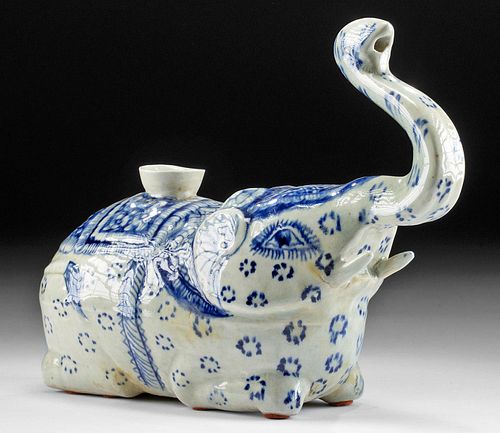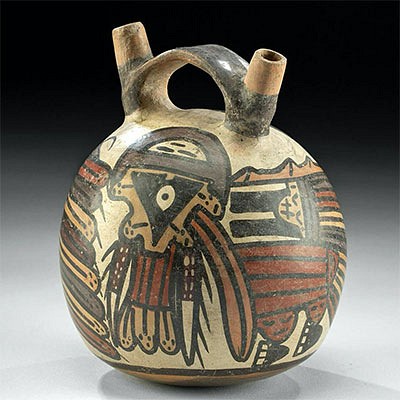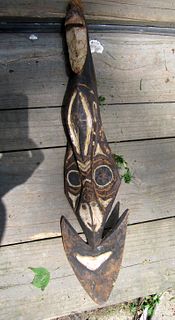19th C. Thai Blue-on-White Pottery Kendi, Elephant Form
Lot 56a
About Seller
Artemis Gallery
686 S Taylor Ave, Ste 106
Louisville, CO 80027
United States
Selling antiquities, ancient and ethnographic art online since 1993, Artemis Gallery specializes in Classical Antiquities (Egyptian, Greek, Roman, Near Eastern), Asian, Pre-Columbian, African / Tribal / Oceanographic art. Our extensive inventory includes pottery, stone, metal, wood, glass and textil...Read more
Categories
Estimate:
$600 - $900
Absentee vs Live bid
Two ways to bid:
- Leave a max absentee bid and the platform will bid on your behalf up to your maximum bid during the live auction.
- Bid live during the auction and your bids will be submitted real-time to the auctioneer.
Bid Increments
| Price | Bid Increment |
|---|---|
| $0 | $25 |
| $300 | $50 |
| $1,000 | $100 |
| $2,000 | $250 |
| $5,000 | $500 |
| $10,000 | $1,000 |
| $20,000 | $2,500 |
| $50,000 | $5,000 |
| $100,000 | $10,000 |
| $200,000 | $20,000 |
About Auction
By Artemis Gallery
Feb 10, 2022
Set Reminder
2022-02-10 10:00:00
2022-02-10 10:00:00
America/New_York
Bidsquare
Bidsquare : Ancient & Ethnographic Art Through The Ages
https://www.bidsquare.com/auctions/artemis-gallery/ancient-ethnographic-art-through-the-ages-8873
Join us for Part Two of a spotlight on two fabulous collections, one from Lumberton, Texas, and the other from Whisnant Gallery in New Orleans. Artemis Gallery info@artemisgallery.com
Join us for Part Two of a spotlight on two fabulous collections, one from Lumberton, Texas, and the other from Whisnant Gallery in New Orleans. Artemis Gallery info@artemisgallery.com
- Lot Description
Southeast Asia, Thailand, ca. late 19th to early 20th century CE. This is a charming porcelain elephant form kendi or ewer with an attractive blue on white glaze. The rotund body is recumbent resting on legs tucked underneath that create a stable base. The head is slightly raised with the trunk curling upward forming the spout with an opening in the tip, and a wider a flared opening is situated on the elephant's back. The ivory white ground contrasts beautifully with the cobalt blue designs which form an elaborate howdah riding cloth and nettipattam or forehead covering. Kendi vessels are unique to Southeast Asia and appear in sculptures and paintings as attributes held by Hindu gods and various figures in Buddhism. Kendi are ritual containers for holy water that has been collected from sacred rivers; kings would use them in coronation ceremonies to wash and purify themselves. Size: 10" L x 4" W x 7.75" H (25.4 cm x 10.2 cm x 19.7 cm)
Provenance: private Lumberton, Texas, USA collection, acquired before 2010
All items legal to buy/sell under U.S. Statute covering cultural patrimony Code 2600, CHAPTER 14, and are guaranteed to be as described or your money back.
A Certificate of Authenticity will accompany all winning bids.
PLEASE NOTE: Due to recent increases of shipments being seized by Australian & German customs (even for items with pre-UNESCO provenance), we will no longer ship most antiquities and ancient Chinese art to Australia & Germany. For categories of items that are acceptable to ship to Australia or Germany, please contact us directly or work with your local customs brokerage firm.
Display stands not described as included/custom in the item description are for photography purposes only and will not be included with the item upon shipping.
#169568Stable hairline fissures around opening neck and on tusks and legs. Modern infill added to legs and tusks to reinforce these areas. Nice craquelure throughout. Felt pads added to base for stability.Condition
- Shipping Info
-
All shipping is handled in-house for your convenience. Your invoice from Artemis Gallery will include shipping calculation instructions. If in doubt, please inquire BEFORE bidding for estimated shipping costs for individual items.
-
- Buyer's Premium



 EUR
EUR CAD
CAD AUD
AUD GBP
GBP MXN
MXN HKD
HKD CNY
CNY MYR
MYR SEK
SEK SGD
SGD CHF
CHF THB
THB














